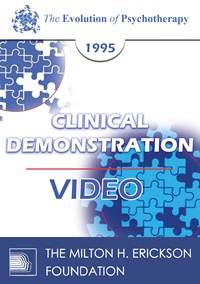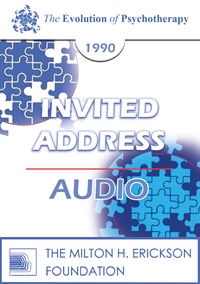
- Average Rating:
- Not yet rated
- Topic Areas:
- Invited Addresses | Trauma | Brief Therapy | Children and Adolescent Therapy | Psychotherapy | Redecision Therapy
- Categories:
- Evolution of Psychotherapy | Evolution of Psychotherapy 1990
- Faculty:
- Mary Goulding, MSW | Judd Marmor
- Duration:
- 1 Hour 26 Minutes
- Format:
- Audio Only
- Original Program Date:
- Dec 13, 1990
- Short Description:
- Today and in the immediate future, short-term therapy is a major available treatment for most clients. In this paper, I will discuss the use of Short-Term Redecision Therapy in the resolution of major childhood traumas, such as physical, sexual, and mental abuse. In Redecision Therapy, the client remembers, re-enacts, uses therapeutically, and then discards these early traumatic scenes.
- Price:
- $15.00 - Base Price
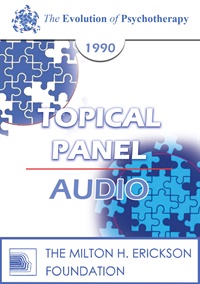
- Average Rating:
- Not yet rated
- Topic Areas:
- Topical Panels | Brief Therapy | Psychotherapy
- Categories:
- Evolution of Psychotherapy | Evolution of Psychotherapy 1990
- Faculty:
- Judd Marmor | James F. Masterson, MD | Donald Meichenbaum, PhD | Mara Selvini Palazzoli, MD
- Duration:
- 58 Minutes
- Format:
- Audio Only
- Original Program Date:
- Dec 13, 1990
- Short Description:
- Topical Panel 04 from the Evolution of Psychotherapy 1990 - Brief Versus Long-Term Therapy Featuring Judd Marmor, MD, PhD; James Masterson, MD; Donald Meichenbaum, PhD; and Mara Selvini Palazzoli, MD. Moderated by Stephen Lankton, MSW.
- Price:
- $15.00 - Base Price
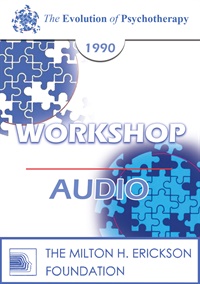
- Average Rating:
- Not yet rated
- Topic Areas:
- Workshops | Psychotherapy | Brief Therapy
- Categories:
- Evolution of Psychotherapy | Evolution of Psychotherapy 1990
- Faculty:
- Paul Watzlawick, PhD
- Duration:
- 2 Hours 23 Minutes
- Format:
- Audio Only
- Original Program Date:
- Dec 15, 1990
- Short Description:
- This workshop will present a brief therapy approach, based on the interaction between those involved in the problem, and on the interventions aimed at changing this problematic interaction by motivating the client(s) to behave "as if" the situation were different from the way it is perceived.
- Price:
- $15.00 - Base Price
- Average Rating:
- Not yet rated
- Topic Areas:
- Clinical Demonstrations | Brief Therapy | Dreamwork | Psychotherapy
- Categories:
- Evolution of Psychotherapy | Evolution of Psychotherapy 1995
- Faculty:
- James Hillman, PhD
- Course Levels:
- Master Degree or Higher in Health-Related Field
- Duration:
- 57:49
- Format:
- Audio and Video
- Original Program Date:
- Dec 15, 1995
- Short Description:
- Educational Objectives: To list three reasons for working with dreams in the initial interview and in brief psychotherapy. Given patients with no dreaming, list techniques for eliciting dreams and for "dream substitutes."
- Price:
-
Sale is $29.00
price reduced from Base Price - $59.00
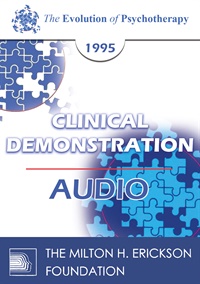
- Average Rating:
- Not yet rated
- Topic Areas:
- Clinical Demonstrations | Redecision Therapy | Brief Therapy | Psychotherapy
- Categories:
- Evolution of Psychotherapy | Evolution of Psychotherapy 1995
- Faculty:
- Mary Goulding, MSW
- Duration:
- 57 Minutes
- Format:
- Audio Only
- Original Program Date:
- Dec 16, 1995
- Short Description:
- Educational Objectives: To list three viable contracts for change by the patient. Ballroom ABC To describe the use of early child scenes in making changes in the present.
- Price:
- $15.00 - Base Price
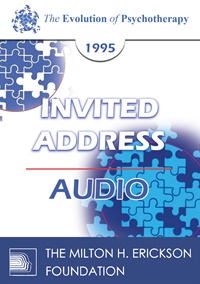
- Average Rating:
- Not yet rated
- Topic Areas:
- Invited Addresses | Psychotherapy | Solution Oriented Approach | Brief Therapy
- Categories:
- Evolution of Psychotherapy | Evolution of Psychotherapy 1995
- Faculty:
- Arnold Lazarus, Ph.D. | Donald Meichenbaum, PhD
- Duration:
- 1 Hour 23 Minutes
- Format:
- Audio Only
- Original Program Date:
- Dec 14, 1995
- Short Description:
- Anyone can perform brief or short-term therapy, but unless pivotal issues are addressed, the treatment will, at best, be too narrow and restricted. It is essential to employ empirically established methods whenever possible, but also to have a framework and rationale for on-the-spot inventiveness. This Invited Address will explain how to be precise and targeted while also ensuring that interactive healing processes are put into effect.
- Price:
- $15.00 - Base Price
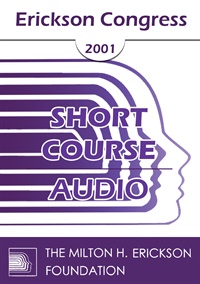
- Average Rating:
- Not yet rated
- Topic Areas:
- Short Courses | Addiction | Utilization | Abuse | Brief Therapy | Ideomotor
- Categories:
- Erickson Congress 2001 | Erickson Congress
- Faculty:
- Bart Walsh, MSW
- Duration:
- 1:20:20
- Format:
- Audio Only
- Original Program Date:
- Dec 06, 2001
- Short Description:
- This presentation poses a substance abuse treatment which acknowledges and accommodates the personal needs being addressed by substance use, bypasses perceived resistance and employs idiosyncratic psycho-biological learning to achieve a body-mind gestalt complementary to the client's sobriety. Client self-empowerment and relapse prevention are built into the intervention. This method develops a safe framework for addressing any subsequent mental health themes directly or indirectly related to substance misuse. Ideomotor questioning is employed in this procedure.
- Price:
- $15.00 - Base Price
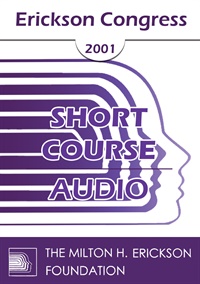
- Average Rating:
- Not yet rated
- Topic Areas:
- Short Courses | Affect | Ideomotor | Brief Therapy
- Categories:
- Erickson Congress 2001 | Erickson Congress
- Faculty:
- Bart Walsh, MSW
- Duration:
- 1:14:27
- Format:
- Audio Only
- Original Program Date:
- Dec 06, 2001
- Short Description:
- This workshop presents a structured protocol for resolving repressed, suppressed or otherwise dated affect using ideomotor questioning. Essential to this model is a progressive ratification series that addresses affect, cognition and behavior. A questioning tree illustrates a Socratic means of affect inquiry. This non-invasive, brief procedure is a useful adjunct to other treatment modalities and instrumental in clarifying the focus of treatment.
- Price:
- $15.00 - Base Price
Tags: Ideomotor Brief Therapy
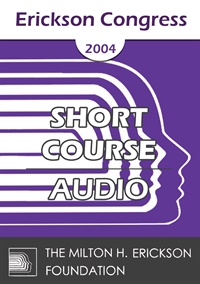
- Average Rating:
- Not yet rated
- Topic Areas:
- Short Courses | Brief Therapy | Ericksonian Hypnosis and Therapy Techniques | Family Therapy | Love | Relationships | Couples Therapy
- Categories:
- Erickson Congress | Erickson Congress 2004
- Faculty:
- Patricia Davis, MA
- Duration:
- 1:19:45
- Format:
- Audio Only
- Original Program Date:
- Dec 02, 2004
- Short Description:
- The main root cause of mental illness is relationships which are not working effectively. Violence, abuse, injustice, neglect and power struggles lead to most individuals' symptoms. This workshop will teach how to change and heal individuals by using their families, no matter how family is defined, to achieve a successful therapy in a brief time period. Attendees will learn specific Ericksonian strategies and healing rituals to which Dr. Erickson would give a "thumbs-up."
- Price:
- $15.00 - Base Price
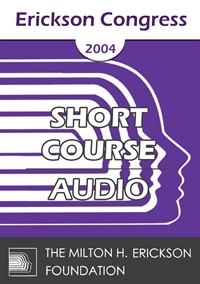
- Average Rating:
- Not yet rated
- Topic Areas:
- Short Courses | Brief Therapy | Children and Adolescent Therapy | Ericksonian Hypnosis and Therapy Techniques | Metaphors | Neuroscience
- Categories:
- Erickson Congress | Erickson Congress 2004
- Faculty:
- Carme Timoneda-Gallart | Silvia Mayoral-Rodriguez, PhD
- Duration:
- 1:08:26
- Format:
- Audio Only
- Original Program Date:
- Dec 02, 2004
- Short Description:
- Children's emotional problems are increasing. Ericksonian approaches provide good psychotherapeutical processes and efficient brief therapy for young people. A neuropsychological basis supports a coherent theoretic frame which explains the origin of emotional problems and clarifies why brief Ericksonian solutions are efficient.
- Price:
- $15.00 - Base Price
Please wait ...


